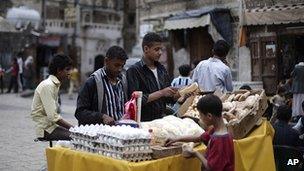Yemen on brink of food crisis, say aid groups
- Published

The aid agencies say there is food available, but many Yemenis are unable to afford it
Instability in Yemen has left the country facing a hunger catastrophe, with nearly half of people without enough food, aid groups have warned.
In a joint warning, a group of seven charities said 10 million Yemenis - 44% of the population - are undernourished, with 5 million requiring emergency aid.
Yemen has been shaken by pro-democracy protests, communal unrest in the north, and an Islamist conflict in the south.
The warning comes a day before an international conference on Yemen.
The so-called Friends of Yemen gathering in the Saudi capital Riyadh on Wednesday is widely expected to concentrate on shoring up security and the fragile political transition the in the country.
In their warning, the aid agencies - CARE, International Medical Corps, Islamic Relief, Merlin, Mercy Corps, Oxfam and Save the Children - say this focus is preventing action to alleviate poverty and hunger.
They say malnutrition rates have doubled in Yemen since 2009, partly as a result of a surge in food and fuel prices.
And the problem has been exacerbated by political instability and conflict, with nearly half a million people displaced from their homes by fighting.
Local markets across much of Yemen have food available, but many Yemenis cannot afford to buy enough food to feed their families, the aid groups warned.
Unable to cope
"Yemeni families are at the brink and have exhausted their ways of coping with this crisis," Oxfam's international director, Penny Lawrence, said.
"Mothers are taking their children out of school to beg on the streets to get money to survive."
Jerry Farrell, Save the Children's country director for Yemen, said: "We know that children always suffer the most when food is in short supply, and unless urgent humanitarian action is taken, Yemen will be plunged into a hunger crisis of catastrophic proportions."
According to UN estimates, a third of Yemeni children - or about 267,000 - are malnourished.
A UN humanitarian aid appeal for Yemen is facing a $262m (£166m) shortfall in funding contributions.
In February, President Ali Abdullah Saleh stepped down in response to months of protests that paralysed Yemen's political system.
Islamist militants have taken advantage of the upheaval to seize parts of the southern province of Abyan, now considered a stronghold of al-Qaeda in the Arabian peninsula (AQAP).
In addition, the government is grappling with Shia Houthi rebels in the north of the country.